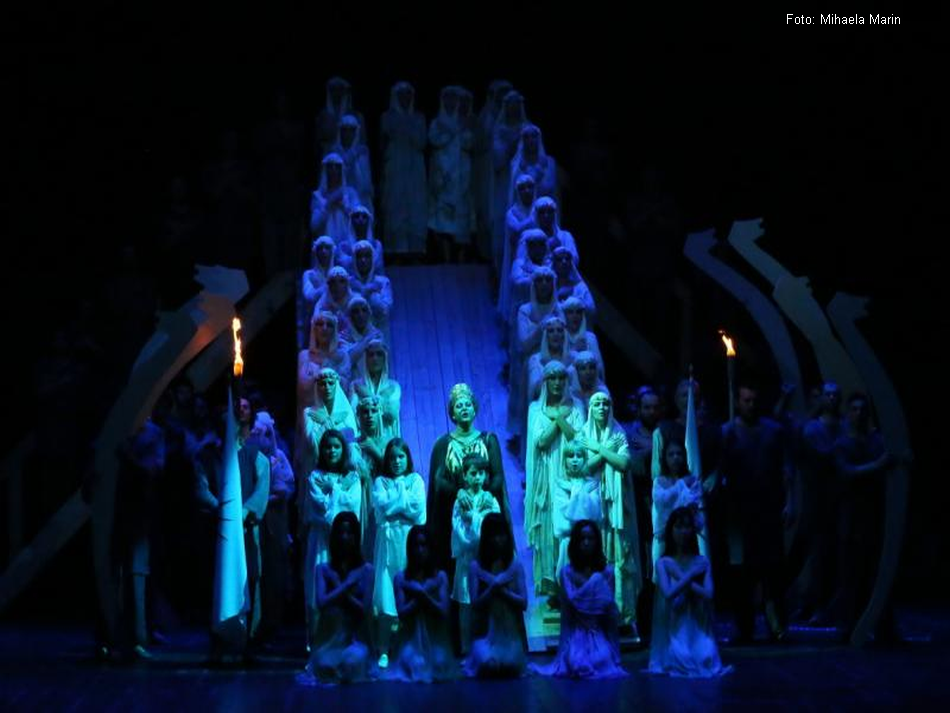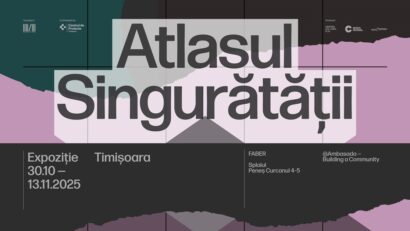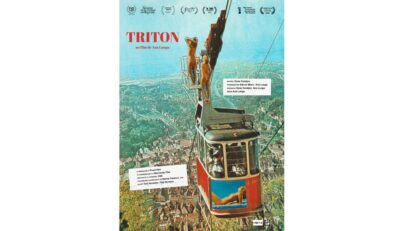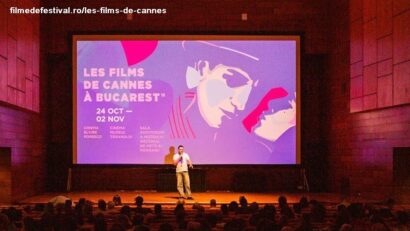The National Theater Festival
Today well bring you a report on the 23rd National Theater Festival in Bucharest

Luana Pleşea, 16.11.2013, 14:10
The production that opened the 23rd National Theater Festival in Bucharest, with the largest number of shows, was Andrei Serban’s The Trojan Women, by Euripides. Serban premiered the piece at the LaMaMa theater in New York, in 1974. In 1990, he brought it to Bucharest as part of his “Ancient Trilogy”, which was a genuine rebirth of Romanian theater. In 2012, Andrei Serban reinvented “The Trojan Women” with the Iasi National Opera. The director himself told us why:
“Beatrice Rancea, appointed as director of the Iasi Opera, was in 1990 a member of the National Theater team, where the “Ancient Trilogy” was first staged. She had this nostalgia of the trilogy, and she wanted it to be resumed. Why the opera? Because “The Trojan Women” is a sort of opera, acted and sung by actors. This time they are professional opera singers — the soloists and choir of the Iasi Opera, who were delighted to have an experience different from what you usually see. It was also an experience for the younger audience, since the people who are now 20 were not even born in 1990. Some of them study in schools what the Trilogy meant, both here and in the US, it is part of the history of theater, but they haven’t seen it. And if they have a possibility of seeing it, of course it is a real experience, and a form of education for the younger audience, and I felt an obligation towards them to rebuild this show.”
Moreover, Andrei Serban believes that the production “The Trojan Women” does have a place in the present social context.
“A tragedy written 2,500 years ago is universally valid. I believe that in any time of tension, at any moment, we can find references to what happens on stage, to what prison and freedom mean in a social context, and what prison and freedom mean from a purely human point of view — there is a prison within us, and a yearning for freedom. These two words are extremely visible in the show, and the spectators who saw the show 20 years ago and came back told me, to my joy, that it had the same strength, the same vitality and freshness as back then.”
The audience of the 2013 edition of the National Theater Festival, which concluded on 3 November, could also see the show that will represent Romania at the 2014 Avignon Festival, as part of the 2014 season of the Brussels National Theater. The show ‘Solitarity’ by Gianina Carbunariu is a production of the Radu Stanca National Theater of Sibiu and the National Theater of the French Community in Brussels, in conjunction with the 2014 Avignon Theater Festival, as part of the European project Cities on Stage.
“Solitarity” is inspired by Romanian reality, but these symbols can be found, in one form or another, anywhere this century. Here is Gianina Carbunariu talking about it:
“There are local symbols here, but I believe that the whole world today faces the same problems. They are global: nationalism, rigidity in traditional values, identity issues. I believe that these local symbols speak internationally. I didn’t want to necessarily depict Romania. I wanted to make a show starting from things I know. It seems to me that this entire problem of nationalism comes from a desire to affirm an identity, sometimes too strongly and in a manner that bothers, to affirm it aggressively, which is a losing formula in the short, medium and long term. What I was interested in more was the lack of solidarity, and not only in Romania. Because of the economic crisis, there is this idea of ‘every man for himself’, whether it is expressed or not. It’s always been like that, but the crisis has just made it worse. I want to bring up questions for the audience, for me and for the actors: Why are we incapable of showing solidarity? Why are we unable to obtain things together? Why are moments of solidarity so rare? Because they do exist. But it takes us too long to realize that we do things if we join forces at some point.”
The ‘Actors in the Foreground’ section of the national festival also included an unforgettable show, at least as the text goes. It is an extremely realistically written life story. ‘Illusions’ was written by contemporary Russian drama writer Ivan Vyrypaiev. It was directed by Cristi Juncu, and is a challenge and an opportunity for any actor.
We asked Andi Vasluianu, who is part of the cast, about his experience with that text:
“When Cristi Juncu called me in for a reading, it was a very emotional experience, but at the same time I told him that I found it terribly difficult. Not just as an actor. I asked myself a lot of things regarding the audience, especially how prepared they were to receive it. This piece has very much to do with the audience. When it comes to other types of text, it has very much to do with the actors or with directing, but in this case it has very much to do with the ability of the audience to join the story. What really got me emotional about this text was the illusion of life. It was how many times we fall into this illusion, how many times we have the feeling that we know what things are all about, when in fact a single phrase could change our life. This is what this text is: some people’s lives get changed by a simple small phrase. This is what fascinated me when it comes to this text: it is extremely similar to us. How we are, what we do, and how many illusions we have.”
At the closing ceremony of the festival, organized by UNITER — the Theatre Union in Romania – between October 25 and November 3, the International Association of Theater Critics granted the Theater of Tomorrow Award to the production “A Streetcar Named Desire”, by Tennessee Williams, directed by Andrei and Andreea Grosu. The three members of the jury, from Romania, Serbia and Canada, said they granted the award to that piece due to its original staging, the ingenious use of space in a ‘less means more’ approach, the refined acting, and the subtle art of creating relations on stage.






























